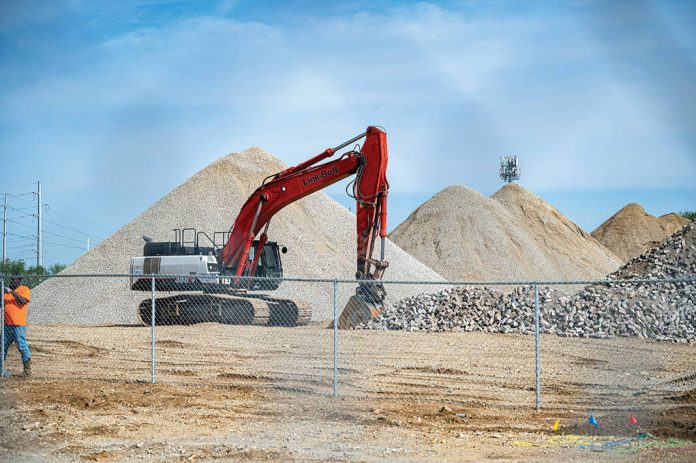Just hours after Indianapolis Mayor Joe Hogsett’s administration said it was concerned about development of the downtown site where owner Keystone Group has been planning to build a 20,000-seat soccer stadium for the Indy Eleven, Keystone announced that archaeologists have discovered 87 burials on a portion of the property.
The company said it planned to use the historic Mount Jackson Cemetery, about three miles west of the property, for “reinterment and memorialization” of the remains of the early Indianapolis settlers found on the site before moving forward with “transformational riverfront development.”
Earlier Wednesday afternoon, the Hogsett administration said publicly that it was interested in purchasing the 20-acre property along the White River, which was the site of the city’s first public cemetery and other burial grounds in the 1800s before being occupied by the now-demolished Diamond Chain Manufacturing Co. for more than a century.
The administration said just one acre of the property, which it is using for the Henry Street Bridge project, is believed to contain as many as 650 remains. Chief Deputy Mayor Dan Parker said in a letter that “proper treatment of the remains on that one acre” could cost as much as $12 million.
“Knowing what we know now, any proposed future development ought to follow a painstaking and inclusive community conversation on the different perspectives on how to respect the history of the site and the individuals still laid to rest there,” Parker said in the letter.
Keystone said the 87 burials were discovered on a 6-acre portion of the property that has been “successfully excavated … in preparation for redevelopment.”
“After careful consideration and conversations with community leaders, Keystone Group has selected Mount Jackson Cemetery as the location for reinterment and memorialization, ensuring utmost respect and dignity for the findings,” the company said. “Mount Jackson Cemetery, maintained by the Wayne Township Trustee’s Office, is just west of the site and rich in Indianapolis history.”
Keystone said it plans to create memorials at the development site as well as the cemetery. It will also launch a website in the coming days to detail the history of the former burial grounds at the site.
The remains are being analyzed and catalogued by IUPUI Professor of Anthropology Jeremy Wilson. Keystone contracted with Noblesville-based firm Weintraut and Associates for excavation efforts. Both parties are also employed by the city for the Henry Street Bridge project.
The developer said the excavation procedures were approved by the Indiana Department of Natural Resources/Department of Historic Preservation and Archaeology.
The process involved archaeologists on site to identify possible signs of a grave. When signs of remains were identified, mechanical excavation within a 100-foot radius of the discovery paused and archaeologists performed controlled excavations. The same method was laid out by Hogsett administration officials last year.
The Hogsett administration ended negotiations with Keystone about the Indy Eleven stadium project on March 22, about a month before announcing it planned to pursue a Major League Soccer franchise with an unnamed group of potential owners. The city has since taken steps to establish a different stadium site on the east side of downtown.
Keystone has been pushing back on the city’s plan, stating that it is “ready to build” the $1.5 billion Eleven Park project immediately, if the city returns to the table.
The lengthy statement from Keystone Group about the discovered burials is the first substantial description the company has given about its excavation findings. The company, which is owned by Indy Eleven owner Ersal Ozdemir, previously only acknowledged finding fragments of human remains at the site in a statement.
Jennifer Pavlik, chief of staff and senior vice president for Keystone, said Wednesday in a statement that “it has always been our steadfast commitment to correct past mishandlings by previous ownership, with dignified and respectful reinterment and memorialization.”
“Keystone Group is ready to build and will continue our coordinated efforts with our expert consultants and the IDNR/DHPA on the remaining acreage,” she said.
In a press release issued by Keystone, Wayne Township Communications Director Jeff Harris said the developer was providing an “opportunity to help us revitalize this historic cemetery.”
“Keystone Group’s ongoing commitment to responsible community development has been evident in this partnership,” Harris said. “We look forward to working together to appropriately memorialize what is found at the former Diamond Chain site, and, at the same time, with Keystone’s contributions, make significant improvements to Mount Jackson Cemetery.”
Leon Bates, a historian heavily involved in the preservation of the cemetery, said Keystone hasn’t previously been upfront with its discoveries. Bates is part of a community advisory group convened by Judith Thomas, deputy mayor of neighborhood engagement for the city of Indianapolis.
“They have been very, very non-cooperative and non-transparent in what they’re doing,” Bates told IBJ.
Pavlik told IBJ that Keystone has been in communication with community leaders, but has not engaged with the community advisory group convened by the Hogsett administration. Pavlik did attend the April meeting of the group, Bates and the spokesperson confirmed.
Historians first raised concerns about remains at the site in May 2023. Both the Hogsett administration and Keystone Group have long known that the project site includes portions of four former cemeteries—including the city’s first African American cemetery, Greenlawn.
By Taylor Wooten, Indianapolis Business Journal





